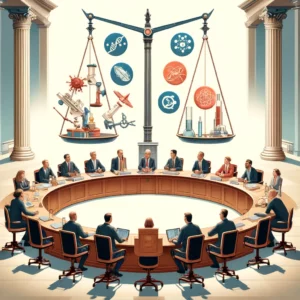Codes and Standards of Ethics from Scientific Societies
It is very instructive to see what standards of ethical behavior various scientific and engineering associations expect from their members. The following societies have established canons of ethics and other standards of professional behavior for the scientists and engineers they represent. One interesting constant among these institutions is their emphasis on protecting public safety and honest and truthful conduct.
American Association of University Professors
The AAUP is a nonprofit membership association of faculty and other academic professionals. They define fundamental professional values and standards for higher education, advance the rights of academics, particularly as those rights pertain to academic freedom and shared governance, and promote the interests of higher education teaching and research.
American Association of University Professors: Statement on Professional Ethics
American Chemical Society
Founded in 1876 and chartered by the U.S. Congress, the American Chemical Society is one of the world’s largest scientific organizations with more than 150,000 members in 140+ countries. Its mission is to advance the broader chemistry enterprise and its practitioners for the benefit of Earth and its people. Their vision is to improve people’s lives through the transforming power of chemistry.
American Chemical Society: Ethical and Professional Guidelines
American Institute of Aeronautics and Astronautics
The American Institute of Aeronautics and Astronautics is the world’s largest technical society dedicated to the global aerospace profession. Created in 1963 by the merger of the two great aerospace societies of the day, the American Rocket Society (founded in 1930 as the American Interplanetary Society), and the Institute of the Aerospace Sciences (established in 1933 as the Institute of the Aeronautical Sciences), AIAA carries forth a proud tradition of more than 80 years of aerospace leadership.
American Institute of Aeronautics and Astronautics: Code of Ethics
American Institute of Chemical Engineers
AIChE is the world’s leading organization for chemical engineering professionals, with more than 60,000 members from more than 110 countries. AIChE has the breadth of resources and expertise you need whether you are in core process industries or emerging areas, such as translational medicine.
American Institute of Chemical Engineers: Code of Ethics
American Mathematical Society
The AMS was founded in 1888 to further the interests of mathematical research and scholarship. It serves the national and international community through its publications, meetings, advocacy and other programs. Their mission statement indicates the society promotes mathematical research, encourages and promotes the transmission of mathematical understanding and skills,
supports mathematical education at all levels, advances the status of the profession of mathematics, and fosters an awareness and appreciation of mathematics and its connections to other disciplines and everyday life.
American Mathematical Society: Ethical Guidelines
American Physical Society
The Constitution of the American Physical Society states that the objective of the Society shall be the advancement and diffusion of the knowledge of physics. It is the purpose of this statement to advance that objective by presenting ethical guidelines for Society members.
American Physical Society: Guidelines for Professional Conduct
American Society of Civil Engineers
The American Society of Civil Engineers represents more than 150,000 members of the civil engineering profession in 177 countries. Founded in 1852, ASCE is the nation’s oldest engineering society. The society stands at the forefront of a profession that plans, designs, constructs, and operates society’s economic and social engine – the built environment – while protecting and restoring the natural environment.
American Society of Civil Engineers: Code of Ethics
American Society of Mechanical Engineers
ASME serves a wide-ranging engineering community through quality learning, the development of codes and standards, certifications, research, conferences and publications, government relations, and other forms of outreach. ASME is a nonprofit professional organization that enables collaboration, knowledge sharing and skill development across all engineering disciplines, while promoting the vital role of the engineer in society. ASME codes and standards, publications, conferences, continuing education, and professional development programs provide a foundation for advancing technical knowledge and a safer world.
American Society of Mechanical Engineers: Code of Ethics of Engineers
American Society of Safety Engineers
The American Society of Safety Professionals is a global association for occupational safety and health professionals. For more than 100 years, they have supported occupational safety and health (OSH) professionals in their efforts to prevent workplace injuries, illnesses and fatalities. ASSE provides education, advocacy, standards development and a professional community to our members in order to advance their careers and the OSH profession as a whole.
American Society of Safety Engineers: Code of Professional Conduct
American Sociological Association
The American Sociological Associations is a national organization for sociologists dedicated to advancing sociology as a scientific discipline and profession serving the public good. It was founded over 100 years ago and is home to 52 special interest sections.
American Sociological Association: ASA Code of Ethics
Association for Computing Machinery
Association for Computing Machinery: ACM Code of Ethics and Professional Conduct
European Commission
European Commission: Responsible Research and Innovation
Human Factors and Ergonomics Society
Human Factors and Ergonomics Society: Code of Ethics
IIT Center for the Study of Ethics in the Professions
IIT Center for the Study of Ethics in the Professions: The Ethics Codes Collection
The Institute of Electrical and Electronics Engineers
The Institute of Electrical and Electronics Engineers: IEEE Code of Ethics
Institute of Industrial Engineers
Institute of Industrial Engineers: Engineering Code of Ethics
International Council on Systems Engineering
International Council on Systems Engineering: INCOSE Code of Ethics
National Academy of Engineering
National Academy of Engineering: Center for Ethics, Engineering and Society
National Science Foundation
National Science Foundation: Broader Impacts
National Society of Professional Engineers
National Society of Professional Engineers: NSPE Code of Ethics for Engineers
Sigma Xi
Society for Neuroscience
Society for Neuroscience: Professional Conduct: SfN Ethics Policy
Society of Public Health Engineers
Society of Public Health Engineers: SoPHE Code of Professional Conduct
ACM-IEEE-CS
The ACM-IEEE-CS George Michael Memorial HPC Fellowships honor exceptional PhD students throughout the world whose research focus is on high performance computing.
Software Engineering Code of Ethics and Professional Practice
Tau Beta Pi
As the only academic honor society that confers recognition on eligible individuals from all engineering disciplines, Tau Beta Pi recognizes those who have conferred honor upon their Alma Maters by distinguished scholarship and exemplary character as students in engineering, or by their attainments as alumni in the field of engineering.
Tau Beta Pi: Code of Ethics of Engineers
World Federation of Engineering Organizations

The World Federation of Engineering Organizations (WFEO) is the international organization for the engineering profession. Founded in 1968, under the auspices of UNESCO, WFEO brings together national engineering institutions from some 100 nations and represents more than 30 million engineers.
World Federation of Engineering Organizations: The Code of Ethics

